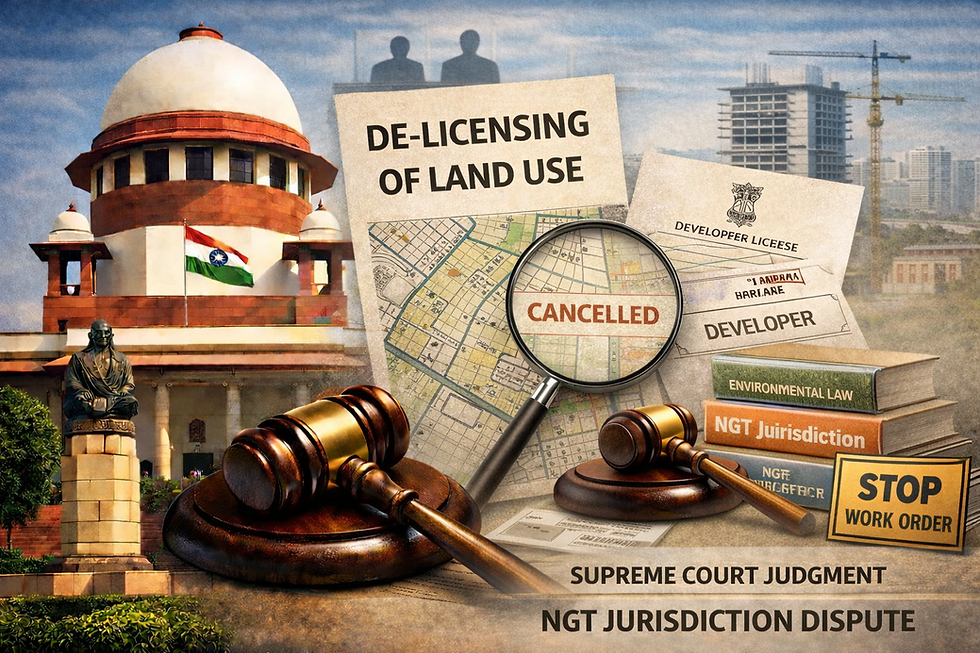Public Interest Turns the Tide" – Supreme Court Upholds Rebate Recovery in Puja Ferro Alloys Case
- Chintan Shah

- Feb 17, 2025
- 4 min read
Summary of the Judgment
Case Name: Puja Ferro Alloys P Ltd. v. State of Goa & Ors. (with connected appeals)
Date of Judgment: 14th February 2025
Court: Supreme Court of India
Judges: Hon'ble Justice Dipankar Datta and Hon'ble Justice Sandeep Mehta
Appellants: Puja Ferro Alloys P Ltd., M/s Karthik Alloys Ltd., Karthik Inductions Ltd., Global Ispat Ltd., Sunrise Electromelt Ltd.
Respondents: State of Goa & Ors.
Advocates: Mr. Santosh Paul (for appellants), Mr. Abhay Anil Anturkar (for respondents)
Relevant Acts & Sections:
Indian Electricity Act, 1910 (Sections 23, 51-A)
General Clauses Act, 1897 (Section 21)
Goa (Prohibition of Further Payments and Recovery of Rebate Benefits) Act, 2002 (Section 3)
Constitution of India (Article 166(3))
Cited Judgments:
GR Ispat Ltd. v. Chief Electrical Engineer, 1999 (1) Goa L.T. 218
Manohar Parrikar v. State of Goa, 2001 SCC OnLine Bom 350
MRF Limited v. Manohar Parrikar & Ors., (2010) 11 SCC 374
Goa Glass Fibre Limited v. State of Goa & Anr., (2010) 6 SCC 499
Pawan Alloys & Casting (P) Ltd. v. UP SEB, (1997) 7 SCC 251
Inderchand Jain v. Motilal, (2009) 14 SCC 663
Satyadhyan Ghosal v. Deorajin Debi, [1960] 3 SCR 590
Hope Plantations Ltd. v. Taluk Land Board, (1999) 5 SCC 590
T.P. Moideen Koya v. State of Kerala, (2004) 8 SCC 106
Background and Facts
This case concerns the legality of a rebate scheme on electricity tariffs granted to industrial units in Goa, its subsequent rescission, and the State's attempt to recover previously granted rebates under the Goa (Prohibition of Further Payments and Recovery of Rebate Benefits) Act, 2002 ("2002 Act"). The appeals arose from the Bombay High Court's decision dismissing writ petitions challenging the recovery notices issued under the 2002 Act.
The lead appeal (Puja Ferro Alloys P Ltd. v. State of Goa & Ors.) was taken as the basis for analysis, with all connected appeals sharing common issues of law and fact.
Key Issues
Whether the appellant-companies were entitled to a 25% rebate on electricity tariffs under the notification dated 30.09.1991.
Whether the rebate could be retrospectively withdrawn by rescinding the 1991 notification via notification dated 31.03.1995.
Whether the demand notices issued under Section 3 of the 2002 Act were valid.
Whether the principles of promissory estoppel and legitimate expectation applied to prevent the State from revoking the rebates.
Whether the case was barred by res judicata in light of previous decisions in GR Ispat and Manohar Parrikar.
Court’s Observations and Reasoning
1. Rebate Eligibility Under the 1991 Notification
The Court noted that the 1991 notification provided a 25% rebate on electricity tariffs for five years from the date of power supply. However, this notification was rescinded with effect from 01.04.1995. Since the appellant-companies received power supply after this date, they could not claim entitlement under the rescinded notification.
"The notification dated 30.09.1991 had life till 31.03.1995 whereafter it stood rescinded, leaving no option but to decline acceptance of their pleas."
2. Validity of the 1995 Rescission and Its Retrospective Effect
The appellants argued that their rights had crystallised when they applied for power before 01.04.1995. The Court rejected this, holding that the rebate was contingent upon actual supply of power. Since none of the appellants received power before the rescission date, their claims were untenable.
"The rights of the appellant-companies crystallized upon making the application for power while the notification dated 30.09.1991 was in force and hence, irrespective of when the power was actually supplied, the appellant-companies are entitled to the benefit of rebate."
3. Legality of the Demand Notices Under the 2002 Act
The Supreme Court upheld the validity of the demand notices issued under Section 3 of the 2002 Act, affirming the High Court’s finding that the law was enacted to recover rebates granted under invalid notifications dated 15.05.1996 and 01.08.1996.
"The 2002 Act does not seek to undo judicial decisions but merely aims to recover and extinguish liabilities arising from the invalid notifications."
4. Applicability of Promissory Estoppel and Legitimate Expectation
The Court rejected the appellants’ reliance on promissory estoppel, citing overriding public interest. Financial constraints justified the State's decision to rescind the rebate scheme.
"Public interest is what turns the tide against the appellant-companies. The SoG had a justifiable ground of supervening public interest to withdraw the grant of rebate in power tariff."
The Court distinguished the present case from Pawan Alloys, noting that in that case, there was no overriding public interest to justify the withdrawal of the rebate.
5. Res Judicata and Finality of Prior Judgments
The Court held that the issue was conclusively decided in GR Ispat and Manohar Parrikar, barring the appellants from relitigating the same question.
"Once a res is judicata, it shall not be adjudged again. The appellant-companies were all parties and are bound by the decision in GR Ispat."
The Court also cited Hope Plantations Ltd. and T.P. Moideen Koya to reiterate that the doctrine of res judicata applies to writ petitions under Article 226.
Conclusion
The Supreme Court dismissed all appeals, holding that:
The appellants were not entitled to rebates under the rescinded 1991 notification.
The 1995 rescission was valid and effective.
The demand notices issued under the 2002 Act were lawful.
The claim of promissory estoppel was untenable due to overriding public interest.
The matter was barred by res judicata.
The Court reaffirmed the principle that financial exigencies can justify policy reversals, and litigants cannot repeatedly challenge settled issues.
"The High Court was right in holding that the appellant-companies before it are not entitled to the rebate and the impugned demand notices do not suffer from any vice including that of illegality."
This judgment underscores the importance of finality in litigation, adherence to statutory requirements for incentive schemes, and the limited scope of promissory estoppel against the State in fiscal matters.



Comments